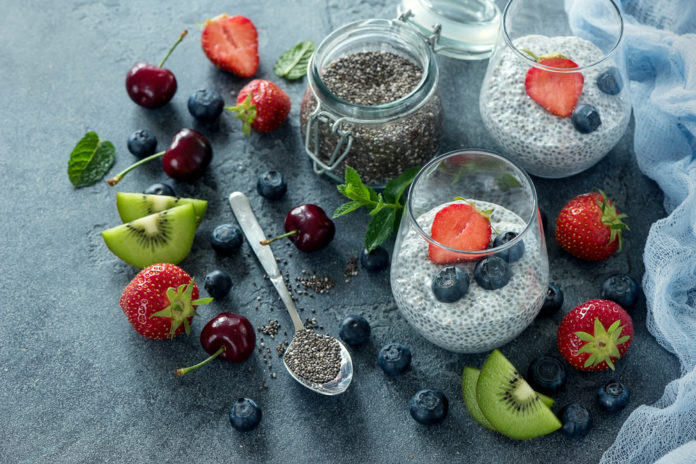Before jumping right into the benefits of chia seeds, we should first honor its nutritional profile. According to the USDA Branded Food Products Database, an ounce (or 28 gram serving) of chia seeds supplies a mere 131 calories while packing a whopping 11 grams of fiber and 6 grams of plant-based protein. It further supplies almost nine grams of fat, predominately in the form of omega-3 fatty acids. Additional chia seed nutrients include calcium, manganese, magnesium, phosphorous, iron, and zinc, just to name a few. The compilation of nutrients in the tiny seeds contribute to these large benefits:
1. Digestive Health
When it comes to the ultimate high-fiber foods, there is no denying chia seeds fits the mold. Fiber is extremely critical in digestive health, encouraging bowel regularity and protective against diseases of the gastrointestinal tract. Based on the newest 2015-2020 Dietary Guidelines for Americans, individuals should aim for at least 14 grams of fiber per 1,000 calories, or 28 grams based on a 2,000-calorie diet. That being said, just one ounce of the little seeds supplies over 33 percent of daily fiber needs!
2. Weight Loss
Being low in calorie and high in fiber, chia seeds can help you reach your weight loss goals, as health experts suggest individuals who consume a nutritionally-dense, high-fiber diet are more likely to exhibit a healthy body mass index (BMI). The plant-based protein can also support lean body mass, while its powerful antioxidants can assist in the recovery process following strenuous activity and increase compliance to your workout regimen. And not to mention, chia seeds are historically known as “runners’ food” and can enhance performance for endurance events!
3. Diabetes Management
Ongoing data suggests chia seeds may help manage diabetes. Primarily related to their high fiber and healthy fat content, chia seeds work to slow keep blood sugars stable and slow down the digestion process.
4. Promote Heart Health
A high-fiber diet has shown to lower blood pressure and cholesterol levels, while the omega-3 fatty acids are notorious for their role in the fight against heart disease, including reducing the risk of a heart attack, stroke, and sudden cardiac death. Chia seeds have also shown to reduce C-reactive protein, a major marker of heart disease risk.
5. Bone Support
Chia seeds supply calcium, phosphorus, magnesium, and protein, all nutrients playing a pivotal role in bone support. While all can benefit from chia seeds, they are exceptionally noteworthy for those who do not consume bone-supporting dairy products.
6. Pregnancy Support
There are a number of physiological changes and additional considerations during pregnancy, and chia seeds can help ensure a healthy diet for mom and developmental needs are taken care for baby. For instance, omega-3 fatty acids are essential for fetal development, making chia seeds a top contender considering the risk of mercury in omega-3 supplying fish. Additional pregnancy-related nutrients chia seeds supply include protein, calcium, iron, and zinc.
7. Safe Across the Board
For lack of better descriptors, chia seeds can get along with a wide variety of people. Reducing animal products or following a vegan lifestyle? Chia seeds offer plant-based protein. Intolerant to lactose or managing a dairy allergy? Yep, they grant the calcium. Not so gung-ho on fish? Omega-3 fatty acids to the rescue. For whatever reason, chia seeds tend to be a safe, nutritionally-packed food across the board.
How to Eat and Enjoy
Luckily for us eager consumers, chia seeds are not difficult to track down. But even more fortunately, they are exseedingly versatile in culinary use. In the kitchen, chia seeds can be used as the following:
Nutrient-Booster
It goes without saying chia seeds can boost nutrients in a multitude of foods, along with introducing new textures. For instance, yogurt (especially plain Greek yogurt) is already nutritious in itself; but with the addition of chia seeds, nutrients will be even more ample! And as a pro tip, you will want to soak them first to get the most fiber bang from chia seeds. Doing so optimizes the seeds’ soluble fiber, a form of fiber that essentially sticks to cholesterol and pulls it from your system. So before introducing to the yogurt, soak the chia seeds by using about one teaspoon of chia seeds in 1/3 cup water, allowing them to hydrate for about 10 minutes.
Egg-Replacer
Whether you are out of eggs or simply do not eat them, chia seeds can replace an egg if itching to bake. Use chia seeds as a binder by combining one teaspoon of chia seeds in 1/3 cup of water to yield “one large egg” for your recipe.
Sauce-Thickener
Rather than purchasing or preparing sauces filled xanthan gum, corn starch, and other thickening agents, chia seeds can be a simple and nutritious alternative! Simply soak whole chia seeds in water for at least 15 minutes to produce a gel, then add to sauces and gravies.
Cruncher-Contributor
Love crunch? Chia seeds grant a satisfactory crunch factor to a number of food products! Crunch into this speedy chia seed crunchy breakfast, crunchy peanut butter snack bites, flax and chia seed crackers, and chia-crusted chicken.
Pudding-Maker
Related to its thickening properties, chia seeds make one desirable pudding! This high-protein vanilla chia seed pudding can be consumed as a healthy breakfast, snack, or dessert option. Add fresh berries, granola, cinnamon, and other favorite toppings to make it your own.






